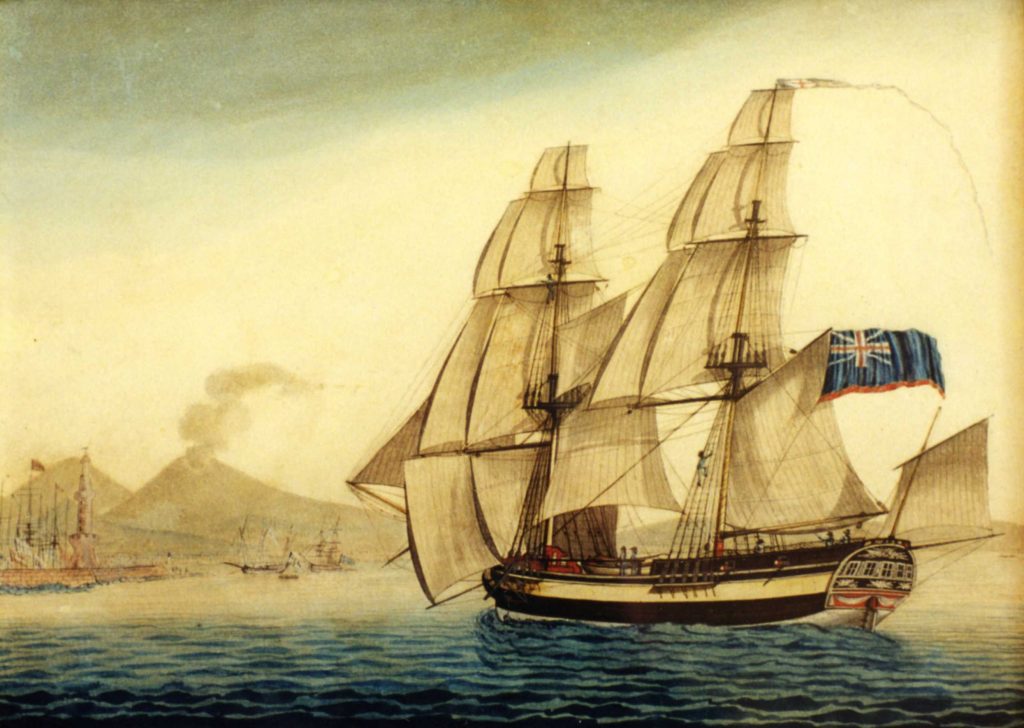While researching her article on Broad’s Ship Agents, Volunteer Linda Bachelor came across this lovely letter of thanks. It comes from Commander Robert Pettet of HMS Termagant who was on convoy duty in the Mediterranean, and was sent to the Company of Merchants at Lloyds in London:
Gentlemen,
Having received the greatest assistance from Capt. William Broad of the Phoenix, Smyrna ship, during my passage from that place to Malta, and from thence to Gibralter; I consider it a duty I owe to that gentleman to state to you the very great exertions he used during the whole of that passage, not only by answering and repeating promptly my signals, but by taking such vessels of the convoy in tow that at any time happened to be sternmost. I have therefore taken this method of testifying my thanks to Capt Broad, being assured that it must meet your appreciation.
The Naval Chronicle Vol 16 1806
In the years 1803 to 1815 Britain was involved in war with France both on land and at sea. In such hostile times British merchant vessels were open to attack at sea, especially by French and Spanish privateers, and so, for security, these valuable mercantile fleets often sailed together in convoy under the protection of British warships. In 1806 HMS Termagant was a Royal Navy warship on the Mediterranean Station on convoy duty.
William Broad was a highly skilled and valued merchant commander in such circumstances, heavily relied upon by the escorting Royal Navy. Captain Broad’s vessels such as Pelican and Phoenix were invariably selected as repeating ships in all convoys. These were ships which would convey signals from the accompanying warships to others and which would maintain the speed and continuity of the convoy. In acknowledgement of this contribution William’s ships were entitled to display a pennant and his crew were always protected from impressment.
William Broad was born in 1772 and raised in the vicinity of Penzance where in the latter part of the 18th century members of the Broad family were established in coastal trade and as ship owners. William was educated at Truro Grammar School and then began his early career at sea attaining command of modest merchant vessels working out of Penzance.

By the late 1700s William was the master in command of the much larger vessels sailing from Truro and Falmouth, such as Spackman, Pelican and Phoenix, involved in trade with the Mediterranean and the Middle East. He also became a member of the Levant Company which promoted such trade.
From 1806 William Broad’s last command at sea was as master of the Phoenix of Truro carrying salt cured pilchards from Cornwall to Italy and returning with olive oil and dried fruit from Smyrna, one of the Levant Company’s trading hubs known as ‘factories’ in the Middle East.
William 1808 had quit the sea in 1808 and by 1809 had established William Broad & Company which became a major shipping agent and merchant firm in Falmouth.
Lloyds of London had begun to deal with maritime insurance in the 1730s. Over the period of the War of the American Revolution and the Napoleonic wars the need for such insurance became vitally important and Lloyds became dominant in the sector. By 1811 Lloyds had decided to set up a network of their agencies in various British ports. William Broad and Co became the first (or one of the very first) of such agents to be appointed for Lloyds, probably as the result of many commendations to the ‘Gentlemen’ of Lloyds from Royal Navy Commanders such as Robert Pettet concerning Captain Broad.
